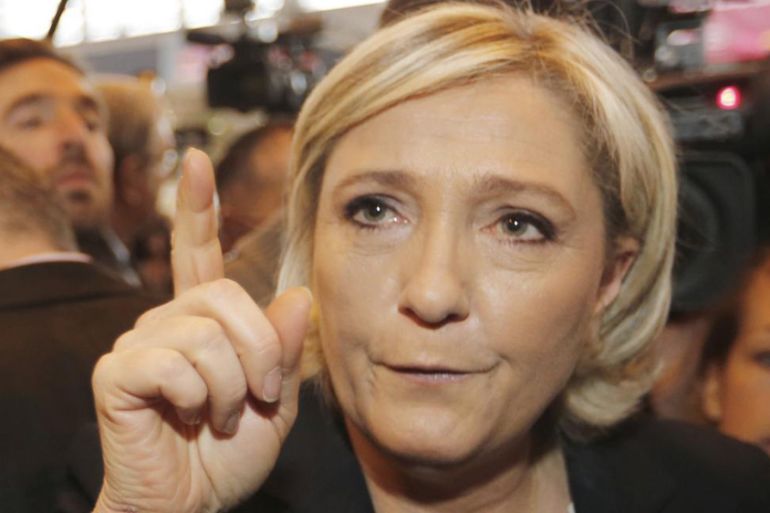Profile: Who is Marine Le Pen?
The leader of the far-right National Front hopes to pull off an upset just as big as the US president’s last November.

In March, Marine Le Pen emerged from a meeting with the Russian President Vladimir Putin in Moscow to deliver a proclamation to the reporter’s gathered: “A new world has emerged.”
The leader of France’s far-right National Front (FN) party hopes that she will be a leading figure in this radical reordering of the global elite, which already counts the election of US President Donald Trump and the British vote to leave the EU among its successes.
Once considered an unrealistic prospect, success for Le Pen in the upcoming presidential vote would cause shockwaves just as large as Brexit or the Trump victory.
She currently sits on about a quarter of the first-round vote, a position which unlike her rival candidates has barely shifted over the past few months.
Second round voting against her likely rival Emmanuel Macron puts Le Pen considerably behind on 40 points to Macron’s 60, but those who followed Trump’s election know better than to write her off on the basis of polls.
READ MORE: French elections – Manufacturing consent
The youngest daughter of far-right stalwart Jean-Marie Le Pen, Marine was born in 1968 and followed in her father’s ideological footsteps by joining FN at 18.
In the coming decades she practised law while increasing her standing in FN, contesting several regional elections along the way.
She picked up several minor political roles in regional and municipal councils in her early 30s, and her most significant as a member of the European Parliament in 2009.
Her biggest break came after her father stepped down as FN leader in 2010, after which she took over the reins of the party.
Islam, the EU, and immigration
In the followings years Le Pen sought to shed the party’s far-right image, distancing herself and the party from her father’s Holocaust denial and racist outbursts, eventually expelling him from the party in 2015, making the FN more palatable to French conservatives and a coming generation that had little recollection of far-right rule under the Nazis.
However while the language has changed, the issues remain largely intact, with Islam, the EU and immigration dominating her platform.
On France’s large Muslim minority, Le Pen has been unequivocal.
“We do not want to live under the rule or threat of Islamic fundamentalism,” she told supporters, further condemning the hijab, prayer rooms in workplaces, the construction of mosques and Pork-free options in school lunches.
On the European Union, Le Pen has threatened to withdraw France from the eurozone and hold a referendum on the country’s continued membership of the bloc.
A Le Pen in the Elysee Palace would cut immigration, ban birthright citizenship, and the automatic right to nationality for the spouses of French citizens.
Unlike her competitors, Le Pen seems unperturbed by a corruption scandal or questions over her ties to Putin’s Russia.
A dogged indifference to scandal made little difference to Trump’s popularity, and that seems to be a lesson Le Pen has learned.